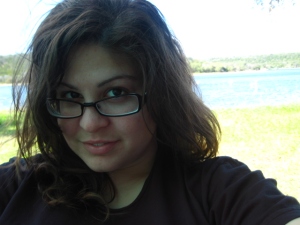 StoryADay participant Gabi (and her alter ego Iggi), also known as Gabriela Pereira is a writer/teacher/entrepreneur living in New York City. She has just graduated from an MFA Program in Creative Writing with a special focus on Writing for Children. She writes middle grade and teen fiction, with the occasional short story for grown-ups thrown in for good measure. She has several post-graduation schemes up her sleeve, many of which include a Do-It-Yourself MFA program.
StoryADay participant Gabi (and her alter ego Iggi), also known as Gabriela Pereira is a writer/teacher/entrepreneur living in New York City. She has just graduated from an MFA Program in Creative Writing with a special focus on Writing for Children. She writes middle grade and teen fiction, with the occasional short story for grown-ups thrown in for good measure. She has several post-graduation schemes up her sleeve, many of which include a Do-It-Yourself MFA program.
Before you started StoryADay how would you have described your writing life?
I would say my writing life was pretty busy. I was in a full-time MFA program and my writing life was very school-centric. I was looking for something to break me out of the MFA mindset. Don’t get me wrong, the MFA was a great experience, but I saw graduation looming at the end of May and I knew I needed to shake things up or I was going to have major separation anxiety come summer.
What made you decide to do StoryADay?
I was in the middle of rewriting my thesis for the third time and I needed a break. I also needed something to propel me into life-post-MFA and StoryADay came at just the right time. I wanted to do a project that was outside of school and outside my thesis, to force me to write for myself and not for school (because that’s what post-MFA writing is all about, right?)
What did you expect to achieve? What did you actually achieve? What did you learn during the challenge?
I expected to write a whole story every day. It lasted only a week and then my thesis deadline reared its ugly head and I had to reorganize my priorities. But the great thing I realized in StoryADay is that I didn’t need school deadlines to make me write–I could motivate myself. And that lesson was probably the most valuable thing StoryADay could have taught me. This is why, even though I didn’t come close to winning the challenge, I still see this past May as a success.
How do you make time for writing?
I try not to think about it. If I think too much about writing before I actually start doing it, I tend to psych myself out. Instead I just start writing and before I know it, I’ve got a bunch of words on the page and it’s time to call it a day. Also, I find that writing “out” is much more productive. My little paper notebook doesn’t have all those pesky distractions like email and twitter and blogs. Ooh, and a little trick I’ve learned: I try to end each writing session at a cliff-hanger or in the middle of a sentence so that when I sit down the next time, I can jump right in and keep writing.
Why do you write? What keeps you motivated?
I write because if I don’t, I start missing my characters. Also, I write because I want to know what will happen next. I live for those surprise moments when the characters do something I wasn’t expecting, or those a-ha moments when some pieces of the puzzle finally come together. It’s that constant feeling of discovery that keeps me motivated.
What are your aspirations?
The realist in me has dreams of writing and teaching and being able to make a reasonable living.
The dreamer in me hopes that DIY MFA might someday take the writing world by storm.
Tell us about your DIY MFA project. It sounds fascinating.
DIY MFA stands for Do-It-Yourself MFA. The premise is that while MFAs are great for some writers, they aren’t necessarily feasible for many writers out there. Either because of logistics, or finances, or family/work responsibilities, many writers who want to do an MFA end up not doing one. The idea here is that since I did an MFA, I wanted to share what I learned and help interested writers put together their own individual writing plan. The DIY MFA method consists of 4 branches: Reading, Writing, Community and Critique, which I divided into “classes.” I posted weekly articles on my blog through the month of September, each day of the week representing a different DIY MFA class. Now in October, though the September extrabloganza is done, DIY MFA will continue in a more organic fashion. But never fear, all the DIY MFA posts and classes will still be there so writers who missed the September fun can catch up. For more information on DIY MFA, visit iggi U. We also have a DIY MFA twitter hash tag (#diymfa) and an online community: http://diymfa.spruz.com/
For more information about me and my many projects, check out my blog at: iggiandgabi.blogspot.com
You can also follow me on twitter: @iggiandgabi
Thanks, Gabi!




